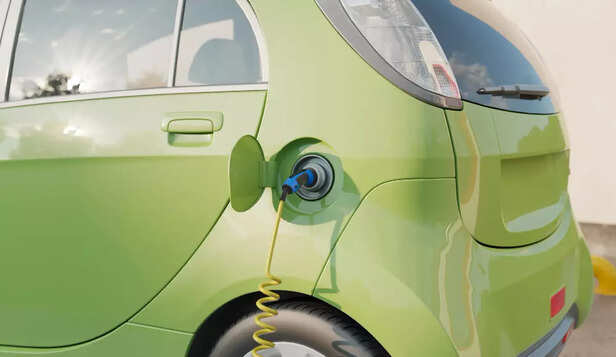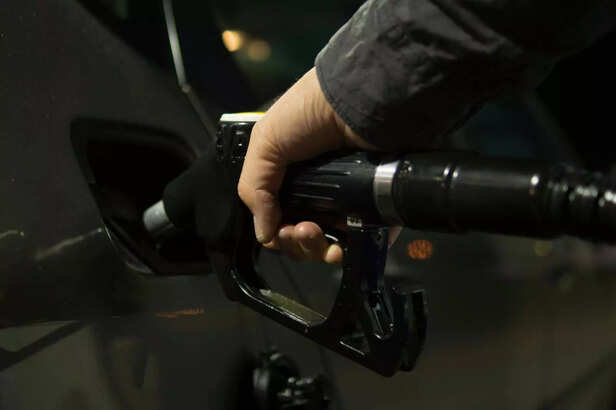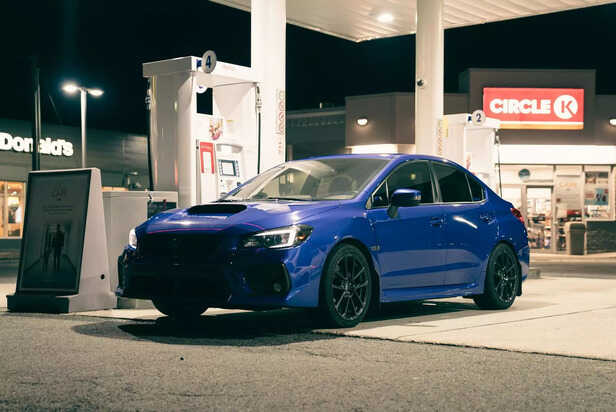EVs Are Everywhere in 2025 But Should You Switch?
Saniya Kotiyal | Tue, 05 Aug 2025
EV or petrol? 2025 makes the decision harder than ever. This article makes it simple based on your lifestyle, comfort, and what’s working in real Indian roads and homes.
A sleek modern car
( Image credit : Freepik )
You're not alone. Choosing a car today isn't as simple as it used to be and we get it. Everyone's talking about electric cars, but petrol still feels safer for many. In this article, we break down what really matters in real life charging vs refueling, how both feel to drive, which one fits city or village life, running costs, and even what support the government is offering right now. If you're trying to decide what actually suits your daily needs, this guide is for you.
![Close up of EV motor]()
So... what even is the actual difference between an electric car and a petrol one? Aren’t they both just cars? Get to know this bottom.
Car which runs on petrol (gasoline) and you fill it at a fuel pump. Inside it there's a loud, hot engine that burns fuel to make the car move. There is an exhaust pipe at the back of it and that's where pollution comes out. It needs regular oil changes, engine service, and yes petrol prices which go up every month. It matters because for decades this was the only choice as it was cheap, easy to fuel and quick to repair anywhere.
This is the one which runs on a big battery, like a laptop. It has no fuel tank and no exhaust pipe, no engine. It gets refueled by plugging it into a charger.And, the best thing about it is super quiet no engine noise. It matters because fuel’s expensive, the planet’s overheating, and your city’s air is turning into soup. Otherwise EVs feel like the cleaner, cooler way forward.
Continue with this it depends on how you live:
If we talk about money, electric cars look expensive at first, but the story changes when you look at the full picture. Petrol cars are still cheaper to buy than electric ones. If you’re buying your first car, an electric car costs about ₹2 to 5 lakh more at the beginning.
Petrol Car- ₹5 to 10 lakh
Electric Car- ₹8 to15 lakh
Now have a look at what you’ll spend after buying the car fuel, charging, and service.
If you drive a lot, plan to keep your car for 5+ years, and want fewer trips to the petrol pump and garage EVs can be a smart move. ![One person at a petrol pump]()
Alright, straight up petrol pumps still win in terms of availability as they're everywhere. Doesn’t matter if you're in a village or on a highway. Charging an EV It’s still better now, but you still need to think a little.
Petrol Car Refueling: Pumps are literally around every corner, it hardly takes 5 minutes and there is no need to check apps. Available in remote areas as well. This is what we’re used to. It’s quick, reliable, and built for people who don’t want to think twice.
EV Charging Refueling: If you're in a big city like Delhi, Bangalore or Mumbai EV charging stations have started popping up in malls, tech parks, and even some public parking spots. But if you're in a small town maybe there’s one charger in the entire area.. And on highways? Only some routes like Mumbai or Delhi have reliable fast chargers.
Charging at Home? This is where EVs really shine if you have the setup. If you live in a house with your own parking, plug it in overnight, and you’re fully charged by morning. But if you're in a flat and your society hasn’t installed charging points.
Road trips with EVs are possible now but only if you plan ahead. There are fast chargers on major highways, but not everywhere. And even when you find one, you might have to wait 30 to 60 minutes to get a decent charge. Wind up this Petrol is easy to plug anywhere but EVs need a bit of strategy.
Both Electric and petrol cars feel very different to drive.
If you want a smooth, quiet, no effort drive especially in city traffic, EVs win. But if you like the feel of driving and don’t mind a bit of noise and gear play, petrol still holds its own.
![Montage of lifestyles]()
There’s no one size fits all answer what works for you depends on how you actually live. Not what’s trending.
Choose the Car That Fits Your Life, Not the Hype
Now you shouldn't worry about what ads or influencers say, just pick a car that suits your real life. If you usually drive short distances and charging is easy for you an electric car is a good choice. But if you go on long trips, have trouble finding charging stations, a petrol car is better. Choose a car that fits your lifestyle, your budget, and what makes you comfortable. Pick what’s right for you, not just what’s popular.
Electric vs Petrol Cars: What’s the Real Difference?

Close up of EV motor
( Image credit : Freepik )
So... what even is the actual difference between an electric car and a petrol one? Aren’t they both just cars? Get to know this bottom.
Petrol Car: The One You Grew Up With
Electric Car: The New which Gaining Fans
Continue with this it depends on how you live:
- Driving long distances every day with and have no time to charge petrol might still be less stressful.
- Tired of burning ₹120/litre on fuel and care about air quality? Electric will feel like a relief.
- Live in a flat with no charging access? That’s a real hurdle.
- Hate going to the service center every few months? EVs are low-drama.
Which Car Is Cheaper in 2025: Petrol or Electric?
Petrol Car- ₹5 to 10 lakh
Electric Car- ₹8 to15 lakh
Now have a look at what you’ll spend after buying the car fuel, charging, and service.
| What You Pay For | Petrol Car (5 Years) | Electric Car (5 Years) |
|---|---|---|
| Fuel or Charging | ₹1.8 lakh | ₹30,000 |
| Servicing & Repairs | ₹25,000 | ₹10,000 |
| Insurance, etc. | ₹50,000 | ₹50,000 |
| Total (5 Years) | ₹2.55 lakh | ₹90,000 |
Where Can You Charge or Refuel Easily in India?

One person at a petrol pump
( Image credit : Pexels )
Alright, straight up petrol pumps still win in terms of availability as they're everywhere. Doesn’t matter if you're in a village or on a highway. Charging an EV It’s still better now, but you still need to think a little.
Petrol Car Refueling: Pumps are literally around every corner, it hardly takes 5 minutes and there is no need to check apps. Available in remote areas as well. This is what we’re used to. It’s quick, reliable, and built for people who don’t want to think twice.
EV Charging Refueling: If you're in a big city like Delhi, Bangalore or Mumbai EV charging stations have started popping up in malls, tech parks, and even some public parking spots. But if you're in a small town maybe there’s one charger in the entire area.. And on highways? Only some routes like Mumbai or Delhi have reliable fast chargers.
Charging at Home? This is where EVs really shine if you have the setup. If you live in a house with your own parking, plug it in overnight, and you’re fully charged by morning. But if you're in a flat and your society hasn’t installed charging points.
Road trips with EVs are possible now but only if you plan ahead. There are fast chargers on major highways, but not everywhere. And even when you find one, you might have to wait 30 to 60 minutes to get a decent charge. Wind up this Petrol is easy to plug anywhere but EVs need a bit of strategy.
Which One Feels Better to Drive: EV or Petrol?
| What You’ll Notice | Electric Cars | Petrol Cars |
|---|---|---|
| Tired legs in traffic? | Nope. No clutch, no gears just press and go | Yes. Lots of gear shifting and clutch pressing |
| Vibration inside the car? | Super smooth no engine, no shaking | Slight shaking from engine and road |
| Easy to park and reverse? | Very easy responds quickly, even in tight spots | Can jerk or stall, especially in manual cars |
| AC slows the car? | Not really. Feels the same with or without AC | Yes. AC takes away a bit of engine power |
| Slowing down feels... | Different slows quickly when you lift your foot | More natural and steady when you let go of the pedal |
| Steering in traffic? | Light and easy, sometimes feels too soft | Heavier, gives more feedback from the road |
Government Support for EVs in 2025: Is It Enough?
Government Help That’s Actually Working
- GST on EVs is just 5%, much lower than petrol/diesel cars
- FAME II scheme gives subsidies on select EVs mainly for two wheelers
- Some states removed road tax and registration charges for EVs
- Public charging stations being set up in cities and highways
- Focus on making EVs in India under “Make in India” plans
Where It Still Falls Short
- EV policies change often and vary from state to state.
- Subsidies are slow and sometimes unclear during purchase.
- Many people still don’t understand how EVs work.
- Very few charging points in smaller towns and rural areas.
- Battery replacement plans are not well explained yet.
What Type of Car Actually Fits Your Life in 2025?

Montage of lifestyles
( Image credit : Pexels )
There’s no one size fits all answer what works for you depends on how you actually live. Not what’s trending.
- If you mostly drive in the city, go for electricity as It's quiet, low running cost, and perfect for traffic.
- Living in a small town or traveling long distances often A petrol car might still be more convenient, fuel stations are everywhere, and you don’t have to plan for charging.
- Having a dedicated parking spot at home or office EVs might feel less stressful.
- If you drive 100+ km a day then range matters. Mid-range EVs (₹10–15L) are catching up fast, but petrol wins for ultra-long drives.
- Petrol cars are still safer for resale for now. EV resale is improving but still evolving.
- Low maintenance EVs win as there are no oil changes and fewer moving parts.
- On a tight budget EV running costs are cheaper over time, but upfront cost is still higher. Petrol cars have more options under ₹6 lakh.
Choose the Car That Fits Your Life, Not the Hype
Frequently Asked Questions
- Do electric cars need insurance like petrol cars?
Yes third party and comprehensive insurance is mandatory. - How safe are EVs during heavy rains or floods?
Good brands are well-insulated but avoid water logged roads. - Is the resale value of electric cars good in 2025?
It’s improving but still lower than petrol cars for now. - Is fast charging safe for EV battery health?
It’s fine occasionally but daily fast charging can reduce battery life.









